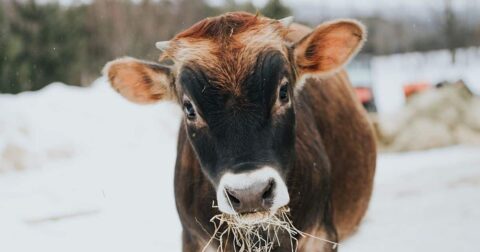Explainer
Humans Destroying Ecosystems: How to Measure Our Impact on the Environment
Climate•7 min read
Reported
The researchers recognized farm animals as “sentient,” naming them "key stakeholders" in a just transition.


Words by Grace Hussain
Ahead of COP28, global leaders are increasingly turning to food systems to tackle climate pollution. Now, experts from Stockholm Environment Institute have released a new policy report with recommendations for reinventing the food system. The common thread — a shift away from factory farms.
The experts specifically call out the harms of industrial meat, as producing beef and dairy products along with other meats is one of the largest contributors to climate change, using vast amounts of water and land while belching a significant amount of greenhouse gasses.
“…Even if fossil fuel emissions were eliminated immediately,” the authors write, “emissions from food systems alone, particularly from animal product production, would make it impossible to limit global warming to 1.5°C and difficult even to limit warming to 2°C.”
Because food production doesn’t exist in a vacuum, eliminating meat — or even just reducing it — is no small task. In much of the world, animal products continue to play a key role in health and nutrition, the authors write, especially for “pregnant and lactating women, young children and people on low incomes with little access to alternatives.”
Yet it’s precisely because animal products continue to play a pivotal cultural, social, economic and nutritional role that a just transition away from them is necessary in order to ensure the best outcomes for people, animals and the environment.
The report argues for a “One Health” strategy for solving these problems — what the CDC defines as an approach that recognizes the ties between humans, animals and the planet. Instead of focusing on one of these issues — for example just animal welfare — One Health solutions also take into account the impacts to human health and the environment.
Industrial agriculture’s high disease risk demonstrates how human, animal and environmental well-being are all interconnected, and, the researchers argue, how all three of these are intrinsically linked to food production.
Part of the problem is that raising animals on factory farms by the billions is driving the destruction of forests and an overreliance on antibiotics. In a worrying turn of events, the number of new pathogens discovered yearly has jumped from three to five in just one decade, a trend scientists believe is due in large part to deforestation. About 40 percent of deforestation is attributable solely to beef production.
The authors also argue that social justice plays an equally important role in food systems transformation. Enter just transition.
Originated by unions in the United States, just transition principles were created to protect the interests of workers and communities as emerging environmental regulations began to shift economies away from dependence on polluting industries. The framework has been employed heavily in the fields of energy and fuel, but has only recently made its way into discussions surrounding food systems transformation.
What makes food systems change especially unique are the stakeholders— workers, communities, but also livestock, according to the research. Farm animals “are sentient beings,” the authors acknowledge, which means they too “will be directly affected by the policies that governments adopt to transform the meat sector.” Any and all solutions, they argue, should “reduce, rather than increase, suffering.”
The researchers recommend a number of shifts, including phasing out subsidies and other government support for factory farms, while at the same time boosting support for alternatives such as plant-based and alternative proteins, as well as policies that support equitable access to food.
Some of the measures they suggest phasing out are so-called “ag-gag laws,” which protect producers from undercover investigators and government-funded campaigns to increase meat consumption.
Meanwhile, the researchers caution against blanket support for meat alternative products, to avoid perpetuating the same inequalities represented within industrial meat production. Instead, they also suggest support for policies and programs that encourage a deeper shift to eating whole-food, plant based products as a means for boosting public health.
The experts also call on policymakers to ensure that the transition planning process is inclusive of all stakeholders, highlighting “truly inclusive, transparent processes that enable stakeholders to participate meaningfully.”
To do this, policymakers must take active steps to combat the underlying prejudices and socioeconomic inequalities fueling injustices within the food system. Racism and other forms of marginalization run deep. For example, within the U.S., only a small percentage of farmers are Black, a trend that originated with the country’s legacy of slavery and became entrenched after the decades of tenancy, rather than ownership, that followed.
Instead of fixing the problem, the U.S. Department of Agriculture made things worse by systematically denying Black farmers the support they offered white farmers. Addressing these injustices requires an understanding of this history, as well as exploring paths for more fair land ownership, according to the authors.
The researchers also recommend that direct support be provided to the stakeholders most heavily impacted by the transition away from meat. Part of that includes “social safety nets and compensation for the disruptions caused,” but also “addressing “the physical and mental impacts” of a changing food system. The authors note that ranching and pastoralism are core to identity in many communities, and a shift away from something so culturally entrenched requires addressing losses that are personal as well as financial.
Ultimately, it’s not just meatpacking workers, the authors remind us. They recommend involving “stakeholders beyond the meat sector itself,” including seasonal farmworkers and small scale farmers, as well as workers and communities of color. While a just transition in the food sector presents challenges that are different from coal or energy communities, the authors urge “time is short and there is a great deal at stake,” as biodiversity and the health of the planet — along with its inhabitants — depend on it.